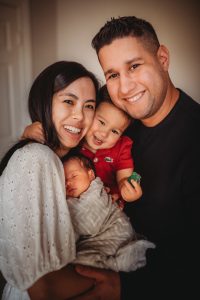PA Madeleine Henriquez Prioritizes Patient Relationships
Mental Health “Permeates” All Aspects of Healthcare, says Mental Health Outreach Fellow
May 26, 2022
By Katy Shenk

As a child, Madeleine Henriquez, PA-C, listened to stories of her parents’ childhood in Vietnam and their immigration to the United States during the Vietnam War. Hearing about the hardships her family faced, and those who helped them along the way, instilled in her a deep sense of gratitude and a desire to help others. Henriquez first learned about the PA profession as a psychology undergraduate and knew this career path would allow her to guide patients along their treatment journeys.
While in college, she shadowed many PAs in various specialties to get a sense of the breadth and depth of PAs’ work. “I loved that the profession was flexible and could provide career growth in every which way,” she says.
Henriquez then attended the University of Texas Medical Branch PA program in Galveston, Texas. It was an ideal location for Henriquez, who found time to balance her didactic year with time on the beach. The Galveston area also offered a range of opportunities for her clinical rotations, from a small-town pediatric clinic to a fast-paced cardiothoracic surgery rotation at the Texas Medical Center. After completing her rotations, she found herself drawn to oncology because of the field’s complex medical diagnoses and unique patient population.
Caring for Cancer Patients
Shortly after graduation, Henriquez accepted a position at the outpatient Leukemia Center at MD Cancer Center in Houston. There, she worked with Prithviraj Bose, MD, specializing in myeloproliferative neoplasms (MPNs). MPNs are a group of blood cancers that derive from the bone marrow stem cells. While life expectancy varies with regard to the type of MPN and treatment, patients can live between five and 15 years. “I developed a passion for this particular group of patients. They are not necessarily acutely ill but have to live with the daunting label of having ‘cancer,’” she says. Henriquez built close relationships with many patients, learning about their families, hobbies, and careers. “I saw this opportunity as a profound privilege, to be that helping hand for those who are suffering and to provide that human connection during these raw moments,” she says.
[Enjoy all the perks of AAPA membership – join or renew today]
Paving the Way for Positive Change
In her first years at the MD Cancer Center, Henriquez says she felt torn between her family’s upbringing – where she was taught not to “stir the pot” or question the status quo – and her desire to voice her ideas to improve the patient experience. “Coming from an Asian immigrant family, I understood where this notion came from, especially when my grandparents came here as ‘outsiders’ and had to assimilate to an entirely new culture and way of living,” she says. “Doing anything that could potentially jeopardize this was not even considered as they had already persevered and risked so much to be where they were.”
With the support of leaders and fellow staff members, however, Henriquez realized that her innovative ideas could help pave the way for positive change. During her time at the Leukemia Center, she partnered with faculty and staff to lead various projects to improve patient care. In conjunction with her supervisor, she created the Acute Care Clinic in hopes of reducing sepsis complications by early introduction of antibiotics, reducing emergency center visits among leukemia patients, and treating complex issues to prevent complications. “Now, when I tell my grandparents about my work and the projects I’ve spearheaded because I decided to speak up, they are proud because they know my strength comes from the foundation they created with all their sacrifices,” she says.
Preparing Providers to Start Conversations about Mental Health
It was also at the Leukemia Center where Henriquez began to see the correlation between mental health issues and chronic leukemia diagnoses, and further understand the connection between mental and physical health more broadly. With her background in psychology, she was especially attuned to noticing her patients’ struggles with mental health. Through this work, and after reeling from the shock of losing a family member to suicide, Henriquez felt convicted to equip herself and others to raise awareness around mental and behavioral health. She realized this passion by applying to become a PA Foundation Mental Health Outreach Fellow in 2018.
The Mental Health Outreach Fellowship is designed to connect PAs’ clinical expertise and compassion to a community need with a specific emphasis on mental health. Fellows are equipped with the evidence- and skill-based Mental Health First Aid training from the National Council for Mental Wellbeing and emerge prepared to train others in the same curriculum. Since the PA Foundation began the fellowship in 2018, more than 2,800 individuals across the country have received Mental Health First Aid (MHFA) training.

“Lightbulb Moment”
As an MHFA instructor, Henriquez taught the course to PA students, NPs, college students, and community college staff and faculty. “I found it very rewarding to play a role in breaking the stigma associated with mental health and seeing that ‘lightbulb moment’ in those who may not have fully understood mental illnesses prior to the program,” she says, emphasizing that providers and clinicians in all specialties should be prepared to identify the warning signs of mental illnesses and start conversations with their patients about seeking treatment.
For Henriquez, the most valuable part of the fellowship was the ability to share her passion for mental health awareness with her workplace and her community. “From my personal experience and as an MHFA instructor, I have noticed that mental health issues may not be fully addressed or recognized in the Asian American community because of stigma. Many times, having a mental illness is seen as a flaw in someone’s character rather than an actual disease or ailment,” she says, adding that the younger generation, of which she is a part, is changing this mindset for the better.
Seeking a New Challenge
Henriquez says she draws courage from her parents and grandparents’ stories of survival and strength, and that this creates a special bond between them and with their shared Vietnamese culture. Earlier this year, she drew upon this strength and stepped into a new role as a sales team member at a pharmaceutical company. While appreciative of the opportunity to apply her knowledge of MPNs and flex a new muscle, her favorite part of being a PA stems from meaningful patient interactions.
“I think the most rewarding thing about being a PA is the relationships I’ve built and created with people. Being able to truly listen to people’s stories, their suffering, and their unique backgrounds is something textbooks cannot teach you,” she says.
You May Also Like
Colts, AAPA Team Up on New Partnership to Improve Mental Health Treatment in Indiana
What PA Practice Looks Like in Neuro-Oncology
Mental Health First Aid Instructor Advocates for PA Students
Thank you for reading AAPA’s News Central
You have 2 articles left this month. Create a free account to read more stories, or become a member for more access to exclusive benefits! Already have an account? Log in.



